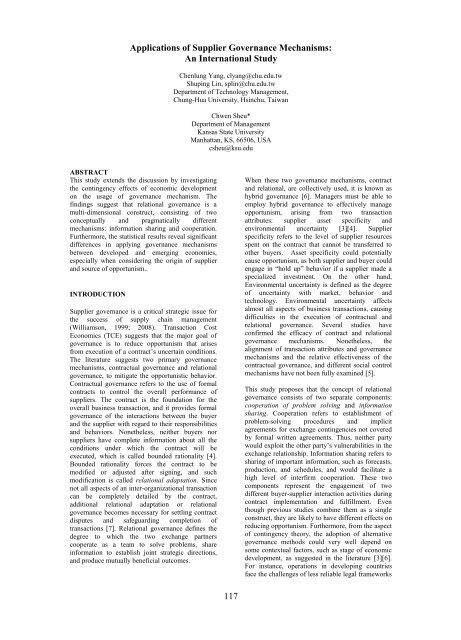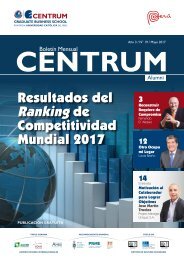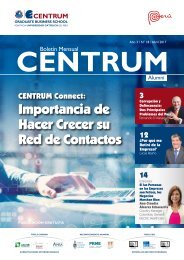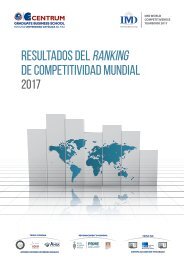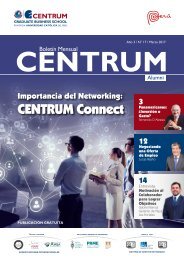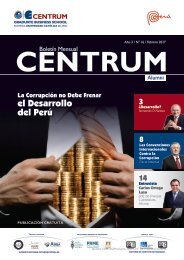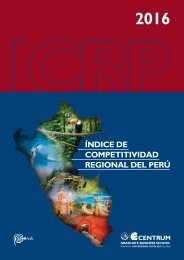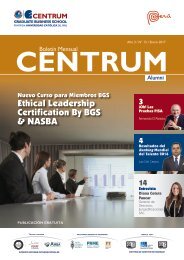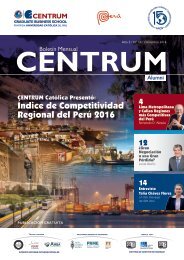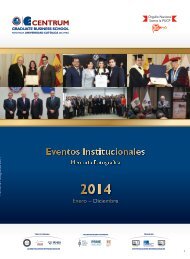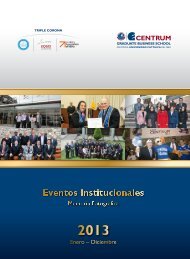Pan-Pacific Conference XXXIV. Designing New Business Models in Developing Economies
This publication represents the Proceedings of the 34th Annual Pan-Pacific Conference being held in Lima, Peru May 29-31, 2017. The Pan-Pacific Conference has served as an important forum for the exchange of ideas and information for promoting understanding and cooperation among the peoples of the world since 1984. Last year, we had a memorable conference in Miri, Malaysia, in cooperation with Curtin University Sarawak, under the theme of “Building a Smart Society through Innovation and Co-creation.” Professor Pauline Ho served as Chair of the Local Organizing Committee, with strong leadership support of Pro Vice-Chancellor Professor Jim Mienczakowski and Dean Jonathan Winterton.
This publication represents the Proceedings of the 34th Annual Pan-Pacific Conference being held in Lima, Peru May 29-31, 2017. The Pan-Pacific Conference has served as an important forum for the exchange of ideas and information for promoting understanding and cooperation among the peoples of the world since 1984. Last year, we had a memorable conference in Miri, Malaysia, in cooperation with Curtin University Sarawak, under the theme of “Building a Smart Society through Innovation and Co-creation.” Professor Pauline Ho served as Chair of the Local Organizing Committee, with strong leadership support of Pro Vice-Chancellor Professor Jim Mienczakowski and Dean Jonathan Winterton.
You also want an ePaper? Increase the reach of your titles
YUMPU automatically turns print PDFs into web optimized ePapers that Google loves.
Applications of Supplier Governance Mechanisms:<br />
An International Study<br />
Chenlung Yang, clyang@chu.edu.tw<br />
Shup<strong>in</strong>g L<strong>in</strong>, spl<strong>in</strong>@chu.edu.tw<br />
Department of Technology Management,<br />
Chung-Hua University, Hs<strong>in</strong>chu, Taiwan<br />
Chwen Sheu*<br />
Department of Management<br />
Kansas State University<br />
Manhattan, KS, 66506, USA<br />
csheu@ksu.edu<br />
ABSTRACT<br />
This study extends the discussion by <strong>in</strong>vestigat<strong>in</strong>g<br />
the cont<strong>in</strong>gency effects of economic development<br />
on the usage of governance mechanism. The<br />
f<strong>in</strong>d<strong>in</strong>gs suggest that relational governance is a<br />
multi-dimensional construct, consist<strong>in</strong>g of two<br />
conceptually and pragmatically different<br />
mechanisms: <strong>in</strong>formation shar<strong>in</strong>g and cooperation.<br />
Furthermore, the statistical results reveal significant<br />
differences <strong>in</strong> apply<strong>in</strong>g governance mechanisms<br />
between developed and emerg<strong>in</strong>g economies,<br />
especially when consider<strong>in</strong>g the orig<strong>in</strong> of supplier<br />
and source of opportunism..<br />
INTRODUCTION<br />
Supplier governance is a critical strategic issue for<br />
the success of supply cha<strong>in</strong> management<br />
(Williamson, 1999; 2008). Transaction Cost<br />
Economics (TCE) suggests that the major goal of<br />
governance is to reduce opportunism that arises<br />
from execution of a contract’s uncerta<strong>in</strong> conditions.<br />
The literature suggests two primary governance<br />
mechanisms, contractual governance and relational<br />
governance, to mitigate the opportunistic behavior.<br />
Contractual governance refers to the use of formal<br />
contracts to control the overall performance of<br />
suppliers. The contract is the foundation for the<br />
overall bus<strong>in</strong>ess transaction, and it provides formal<br />
governance of the <strong>in</strong>teractions between the buyer<br />
and the supplier with regard to their responsibilities<br />
and behaviors. Nonetheless, neither buyers nor<br />
suppliers have complete <strong>in</strong>formation about all the<br />
conditions under which the contract will be<br />
executed, which is called bounded rationality [4].<br />
Bounded rationality forces the contract to be<br />
modified or adjusted after sign<strong>in</strong>g, and such<br />
modification is called relational adaptation. S<strong>in</strong>ce<br />
not all aspects of an <strong>in</strong>ter-organizational transaction<br />
can be completely detailed by the contract,<br />
additional relational adaptation or relational<br />
governance becomes necessary for settl<strong>in</strong>g contract<br />
disputes and safeguard<strong>in</strong>g completion of<br />
transactions [7]. Relational governance def<strong>in</strong>es the<br />
degree to which the two exchange partners<br />
cooperate as a team to solve problems, share<br />
<strong>in</strong>formation to establish jo<strong>in</strong>t strategic directions,<br />
and produce mutually beneficial outcomes.<br />
When these two governance mechanisms, contract<br />
and relational, are collectively used, it is known as<br />
hybrid governance [6]. Managers must be able to<br />
employ hybrid governance to effectively manage<br />
opportunism, aris<strong>in</strong>g from two transaction<br />
attributes: supplier asset specificity and<br />
environmental uncerta<strong>in</strong>ty [3][4]. Supplier<br />
specificity refers to the level of supplier resources<br />
spent on the contract that cannot be transferred to<br />
other buyers. Asset specificity could potentially<br />
cause opportunism, as both supplier and buyer could<br />
engage <strong>in</strong> “hold up” behavior if a supplier made a<br />
specialized <strong>in</strong>vestment. On the other hand,<br />
Environmental uncerta<strong>in</strong>ty is def<strong>in</strong>ed as the degree<br />
of uncerta<strong>in</strong>ty with market, behavior and<br />
technology. Environmental uncerta<strong>in</strong>ty affects<br />
almost all aspects of bus<strong>in</strong>ess transactions, caus<strong>in</strong>g<br />
difficulties <strong>in</strong> the execution of contractual and<br />
relational governance. Several studies have<br />
confirmed the efficacy of contract and relational<br />
governance mechanisms. Nonetheless, the<br />
alignment of transaction attributes and governance<br />
mechanisms and the relative effectiveness of the<br />
contractual governance, and different social control<br />
mechanisms have not been fully exam<strong>in</strong>ed [5].<br />
This study proposes that the concept of relational<br />
governance consists of two separate components:<br />
cooperation of problem solv<strong>in</strong>g and <strong>in</strong>formation<br />
shar<strong>in</strong>g. Cooperation refers to establishment of<br />
problem-solv<strong>in</strong>g procedures and implicit<br />
agreements for exchange cont<strong>in</strong>gencies not covered<br />
by formal written agreements. Thus, neither party<br />
would exploit the other party’s vulnerabilities <strong>in</strong> the<br />
exchange relationship. Information shar<strong>in</strong>g refers to<br />
shar<strong>in</strong>g of important <strong>in</strong>formation, such as forecasts,<br />
production, and schedules, and would facilitate a<br />
high level of <strong>in</strong>terfirm cooperation. These two<br />
components represent the engagement of two<br />
different buyer-supplier <strong>in</strong>teraction activities dur<strong>in</strong>g<br />
contract implementation and fulfillment. Even<br />
though previous studies comb<strong>in</strong>e them as a s<strong>in</strong>gle<br />
construct, they are likely to have different effects on<br />
reduc<strong>in</strong>g opportunism. Furthermore, from the aspect<br />
of cont<strong>in</strong>gency theory, the adoption of alternative<br />
governance methods could very well depend on<br />
some contextual factors, such as stage of economic<br />
development, as suggested <strong>in</strong> the literature [3][6].<br />
For <strong>in</strong>stance, operations <strong>in</strong> develop<strong>in</strong>g countries<br />
face the challenges of less reliable legal frameworks<br />
117


